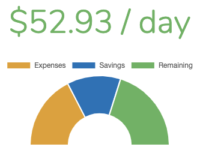Why I Ditched AWS For Software Development

I’ve managed AWS EC2 instances as part of my software development duties at my day jobs for years. In my personal projects however, Amazon’s STILL clunky web interface and billing setup have pushed me to more streamlined, cheaper competitors. Even Amazon’s belated response to these competitors (Lightsail) hasn’t pulled me back.
What You Get With AWS
The organizations I’ve worked for are 100% sold on Amazon’s motto of “only pay for what you use”. Unfortunately, all too often that motto can be translated as “pay for every single thing you use”. You want to store something on your server? Here’s a bill for that. You want people to get data from your server? Another bill. You want people to actually find your server (DNS)? You get the idea. To be clear, these extra charges are usually neglible for a small and responsible development team. That said, it doesn’t take much blow through a small team’s monthly infrastructure budget. All it takes is one long running data transfer intensive process and there is no easy way to prevent it.
And then there’s the interface, ugh. I’ve never met someone who actually enjoyed using the AWS Management Console. The UI has certainly improved over the years but with so many services on offer (I lost track years ago), there’s no way to have the kind of clean experience I expect from everything else I use online.
When It Makes Sense to Use AWS and EC2
There are plenty of perfectly legitimate use cases where AWS will be your best option. One example is needing to test software on a seriously beefy set of specs. I’m talking dozens of vCPUs or hundreds of GBs of memory. In that case, you aren’t going to find much better options than AWS or Microsoft’s Azure. Though, for almost all uses I’ve seen at companies with less than a couple hundred developers, there are better options.
Alternatives to AWS for Software Development
So what do I recommend? There are several VPS providers out there that seem to do everything I want better than Amazon’s EC2. While often being cheaper as well. Linode, Digital Ocean, and Vultr. These providers are a dime a dozen but I found those three to have the highest customer reviews, hardware performance, all with a clean user interface.
I spent some time exploring each service and eventually settled on Vultr as the best VPS provider for my needs. All have similar pricing for their respective virtual hardware but Vultr’s customer support and web interface won out.
Linode
Linode’s site was horribly outdated and I definitely got some GoDaddy vibes from using their site. Comparing any site to GoDaddy is not a compliment. They’ve updated their site to look almost exactly like Vultr’s but I’d put money on it being little more than a visual refresh. I can’t confirm because as part of that update or another, they wanted additional payment information from me just to login again.
DigitalOcean
I decided against DigitalOcean purely based on my poor experience with their customer support team. As with the other two providers I tested, there was a special for a free amount of hosting when signing up with DigitalOcean. It was small amount compared to how much I actually use each month but it was appreciated.
Unfortunately, there was some technical snafu on DigitalOcean’s end where it was never applied to my account. When I reached out to DigitalOcean’s support team just minutes after registration to figure out why I didn’t see it yet, they claimed I didn’t sign up from the correct page. Though this should NOT have been necessary, I even showed them the page I visited from my history during registration. All I got in return was essentially a “sorry, there’s nothing we can do”.
I had heard good things about their support so take my story with a grain of salt but from my experience, that’s a huge red flag and I just couldn’t trust my infrastructure with DigitalOcean.
Vultr
Vultr stood out from the options I tested by being the only one that felt designed to be simple from the ground up. And without trying to dumb the technology down to the point of nonsense (I’m talking to you DigitalOcean with your “Droplets”). Vultr was the quickest to get going and when I had to reference one of their articles regarding their DNS hosting, it was a refreshing few hundred words getting right to the point of my question.
All of the features seemed perfect for me. Want to make sure you don’t go over the generous data transfer allowance? There’s notifications for that and even the option to force a limit on a server’s data usage. Another possibly unique to me requirement was the ability to prepay for services. This isn’t possible with AWS and has been such an improvement with my billing. Other providers offer this but it’s just another box Vultr ticked for me.
If you do choose to sign up for Vultr, consider using my affiliate link when you register. Whether you choose to or not, I highly recommend them.

A Word on Lightsail
Amazon has responded to these competitors by offering (yet another damn) service, Lightsail. They even seem to acknowledge the shortcomings of the AWS Management Console by having an entirely separate management interface for it. I support the added competition but after testing it out on my own, it’s clear Lightsail suffers from some of the same usability problems as AWS (e.g. same billing system, same poor documentation). Still, I will be keeping an eye on this one to see if the shortcomings improve and I learn to trust AWS for my software development infrastructure needs again.





